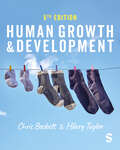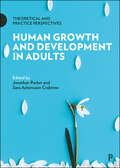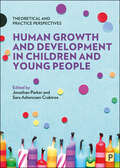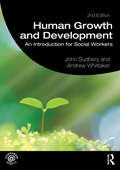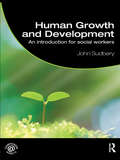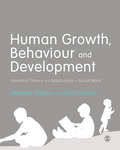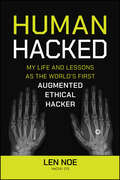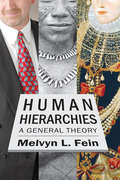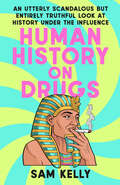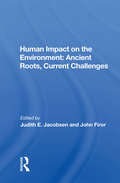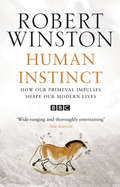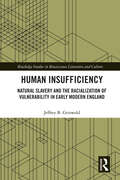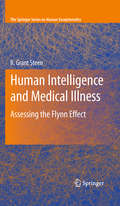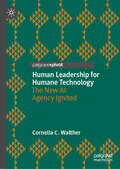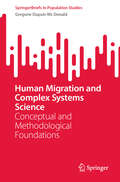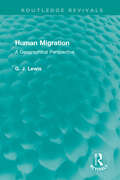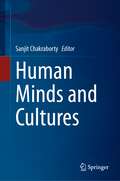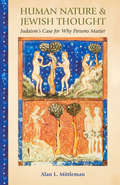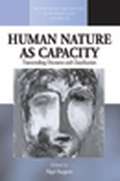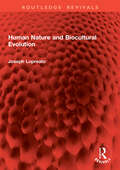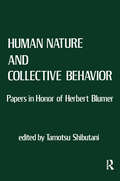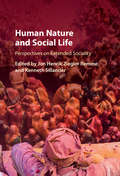- Table View
- List View
Human Growth and Development
by Chris Beckett Hilary TaylorOur bestselling social work textbook is back again. Taking you right back to basics, this book explains and analyses key theories in a really accessible way before going on to discuss, in detail, how theory can be incorporated into every day social work practice. Each chapter contains activities with step-by-step commentaries for discussion, self-analysis and critical reflection. The book very loosely follows the shape of a human life, beginning with a birth and ending with a death, but many of the chapters deal with ideas and topics that are relevant at many different stages of life, such as bereavement, attachment and learning. Its focus throughout is on psychosocial development – so psychological development within a social context – rather than physical development. This book is by Chris Beckett, a social work academic and novelist who previously worked in child and family social work, and Hilary Taylor, a psychotherapist and former social work academic who used to work in the field of social work with adults. It is the go-to guide for anyone studying for careers in the helping professions, such as nurses, social workers, occupational therapists, teachers and counsellors. It′s also supported by an online case study resource. Follow the lives of people living in the fictional London Borough of Bexford, with 12 extended case studies to help you explore key issues and themes raised in the book as well as develop the skill of linking theory to practice.
Human Growth and Development in Adults: Theoretical and Practice Perspectives
by Jonathan Parker and Sara Ashencaen CrabtreeUniquely wide-ranging in its coverage of key concepts, themes and issues relating to human growth and development in adults, this textbook explores the crucial challenges and transitions that adults negotiate in their lives. It examines key topics and issues within professional practice with adults and their families, covering a wide range of practice areas and fusing essential theory and research with practical application. Drawing on insights and debates from across sociology, psychology, criminology and aligned disciplines, this textbook is thoughtfully structured to provide an accessible and supportive resource. Key features include: • chapter-by-chapter summaries, case studies and practice examples; • active learning activities to consolidate knowledge; • a broad range of tools to develop critical thinking and reflective practice. With a companion volume that addresses children and young people, this is an essential tool for students and a valuable refresher resource for experienced practitioners.
Human Growth and Development in Children and Young People: Theoretical and Practice Perspectives
by Jonathan Parker and Sara Ashencaen CrabtreeUnparalleled in its coverage of concepts and themes, this textbook uses insights from across sociology, psychology, criminology and other areas of expertise to show how children and young people negotiate crucial challenges and transitions in their lives. It considers a wide range of theories, issues and practice dimensions and clearly shows how they connect, with fresh insights on topics including mental health, bereavement and disability in children. Foregrounding cultural diversity as a crucial dimension of sensitive practice and placing an emphasis on thinking critically and practicing reflectively throughout, this book also: • Includes helpful chapter introductions, summaries and annotated further readings • Features a range of case studies, linking theory to practice • Provides active learning exercises, enabling you to apply and consolidate learning With a partner volume that addresses human growth and development in adults, this is an invaluable tool for students as well as a useful refresher resource for experienced practitioners.
Human Growth and Development: An Introduction for Social Workers (Student Social Work)
by Andrew Whittaker John SudberySocial workers work with people at all stages of life, tackling a multitude of personal, social, health, welfare, legal and educational issues. As a result, all social work students need to understand human growth and development throughout the lifespan. This fully revised and expanded second edition of this introductory text for social workers provides a knowledge base about human development from conception to death. It is designed to encourage understanding of a wide range of experiences: from the developmental trajectories of children in care, to adult mental distress and the experiences of people with dementia, to bereavement. Using engaging narratives to illustrate each topic, the authors clearly introduce and analyse different theoretical approaches, and link them to real-life situations faced by social workers. Packed with case studies, this student-friendly book includes overviews, summaries, questions and further reading in each chapter, as well as a ‘Taking it further’ section providing greater depth on key theoretical issues. A reference section contains a glossary and overviews of the principal theories discussed throughout the book. It is an essential read for all social work students.
Human Growth and Development: An Introduction for Social Workers (Student Social Work)
by John SudberySocial workers work with people at all stages of life, tackling a multitude of personal, social, health, welfare, legal and educational issues. As a result, all social work students need to understand human growth and development throughout the lifespan. This introductory text provides a knowledge base about human development from conception to death. It is designed to encourage understanding of a wide range of experiences, including some very difficult ones, such as child abuse, the developmental trajectories of children in care, mental distress, the experience of people with dementia, the experience of torture victims and untimely bereavements. Using engaging narratives to illustrate real-life situations, the author analyses them to demonstrate the link between theory, and different theoretical approaches, and practice. Packed with case studies, this student-friendly book includes overviews, summaries, questions and further reading in each chapter as well as a more formal academic section designed to challenge and intrigue students. A reference section contains a glossary and overviews of the principal theories discussed throughout the book. It is an essential read for all social work students.
Human Growth, Behaviour and Development: Essential Theory and Application in Social Work
by Alastair Gibson Neil GibsonUnderstanding the way in which individuals develop before birth, as babies, children and adolescents through to young and older adulthood towards death is an important part of any social work role. Being able to skilfully apply this understanding in real life practice situations is even more important, as purposeful translations of human development are at the heart of effective professional practice. Introducing students to emotional, psychological and social developmental theories of human growth before exploring in detail how these theories can be incorporated into practice, this book will ensure students have all the tools they need to not only understand but critically appraise and apply psychosocial theories early on in training and whilst on placement. With the help of real world case studies, summaries and tips for further study, it will show students how life course theories inter-relate and how they can make appropriate, purposeful translations of theory into skilled, professional practice.
Human Growth, Behaviour and Development: Essential Theory and Application in Social Work
by Alastair Gibson Neil GibsonUnderstanding the way in which individuals develop before birth, as babies, children and adolescents through to young and older adulthood towards death is an important part of any social work role. Being able to skilfully apply this understanding in real life practice situations is even more important, as purposeful translations of human development are at the heart of effective professional practice. Introducing students to emotional, psychological and social developmental theories of human growth before exploring in detail how these theories can be incorporated into practice, this book will ensure students have all the tools they need to not only understand but critically appraise and apply psychosocial theories early on in training and whilst on placement. With the help of real world case studies, summaries and tips for further study, it will show students how life course theories inter-relate and how they can make appropriate, purposeful translations of theory into skilled, professional practice.
Human Hacked: My Life and Lessons as the World's First Augmented Ethical Hacker
by Len NoeDiscover the future of cybersecurity through the eyes of the world's first augmented ethical hacker In Human Hacked: My Life and Lessons as the World's First Augmented Ethical Hacker by Len Noe, a pioneering cyborg with ten microchips implanted in his body, you'll find a startlingly insightful take on the fusion of biology and technology. The author provides a groundbreaking discussion of bio-implants, cybersecurity threats, and defenses. Human Hacked offers a comprehensive guide to understanding an existing threat that is virtually unknown. How to implement personal and enterprise cybersecurity measures in an age where technology transcends human limits and any person you meet might be augmented. The book provides: Exposure of a subculture of augmented humans hiding in plain sight Explorations of the frontier of bio-Implants, showing you the latest advancements in the tech and how it paves the way for access to highly restricted technology areas Discussions of cybersecurity tactics, allowing you to gain in-depth knowledge of phishing, social engineering, MDM restrictions, endpoint management, and more to shield yourself and your organization from unseen threats A deep understanding of the legal and ethical landscape of bio-implants as it dives into the complexities of protections for augmented humans and the ethics of employing such technologies in the corporate and government sectors Whether you're a security professional in the private or government sector, or simply fascinated by the intertwining of biology and technology, Human Hacked is an indispensable resource. This book stands alone in its category, providing not just a glimpse into the life of the world's first augmented ethical hacker, but also offering actionable insights and lessons on navigating the evolving landscape of cybersecurity. Don't miss this essential read on the cutting edge of technology and security.
Human Hierarchies: A General Theory
by Melvyn L. FeinHuman beings are hierarchical animals. Always and everywhere, people have developed social ranking systems. These differ dramatically in how they are organized, but the underlying causal mechanisms that create and sustain them are the same. Whether they are on the top or bottom of the heap, people attempt to be superior to some other persons or group. This is the root of Melvyn L. Fein's thesis presented in Human Hierarchies: A General Theory. Fein traces the development of changes from hunter-gatherer times to our own techno-commercial society. In moving from small to large communities, humans went from face-to-face contests for superiority to more anonymous and symbolic ones. Societies evolved from hunting bands where the parties knew each other through big-men societies, chieftainships, agrarian empires, patronage chains, caste societies, estate systems, and market-oriented democracies. Where once small groupings were organized primarily by strong forces such as personal relationships, the now standard large groupings are more dependent on weaker forces such as those provided by social roles. Bureaucracies and professional roles have become prominent. Bureaucracies allow large-scale organizations to maintain control of people by limiting the potential destructiveness of unregulated tests of strength and by clarifying chains of command. Their rigidity and unresponsiveness requires that they be supplemented by professional roles. At the same time, a proliferation of self-motivated experts delegate authority downward, thereby introducing a more flexible decentralization. This analysis is a unique and significant advance in both the sociology and anthropology of stratification among humans.
Human History on Drugs: An Utterly Scandalous but Entirely Truthful Look at History Under the Influence
by Sam KellyA lively, hilarious, and entirely truthful look at the druggie side of history&’s most famous figures, including Shakespeare, George Washington, the Beatles, and moreDid you know that Alexander the Great was a sloppy drunk and William Shakespeare was a stoner? Or how about the fact that Steve Jobs believed taking LSD helped him create the Apple computer, or that Sigmund Freud loved cocaine so much he took it all the time and prescribed it to his patients?In Human History on Drugs, Sam Kelly introduces us to the history our teachers never told us, offering up irreverent and insightful commentary as he sheds light on some truly bizarre aspects of the historical characters we only thought we knew. With chapters spanning from Ancient Greece (&“The Oracle of Delphi Was Huffing Fumes&”) to modern times (&“Carl Sagan Got Astronomically High&”), Kelly's research covers all manner of eras, places, and, of course, drugs. History is rife with drug use and drug users, and Human History on Drugs takes us through those highs (pun intended) and lows on a witty and entertaining ride that uncovers their mind-boggling impact on our past.
Human Impact On The Environment: Ancient Roots, Current Challenges
by John Firor Judith E. JacobsenThis book explores the way in which human culture and technology have altered the environment through time. The contributors, drawn from a wide variety of disciplines, including anthropology, biology, history, physics and atmospheric science, explore the relationship between humans and the environment as an ongoing process, not just as a recent art
Human Instinct
by Professor Lord Robert WinstonFrom caveman to modern man ...Few people doubt that humans are descended from the apes; fewer still consider, let alone accept, the psychological implications. But in truth, man not only looks, moves and breathes like an ape, he also thinks like one. Sexual drive, survival, competition, aggression - all of our impulses are driven by our human instincts. They explain why a happily married man will fantasize about the pretty, slim, young woman sitting across from him in the tube and why thousands of people spend their week entirely focused on whether their team will win their next crucial match. But how well do our instincts equip us for the twenty-first century? Do they help or hinder us as we deal with large anonymous cities, stressful careers, relationships and the battle of the sexes? In this fascinating book, Robert Winston takes us on a journey deep into the human mind. Along the way he takes a very personal look at the relationship between science and religion and explores those very instincts that make us human.
Human Insufficiency: Natural Slavery and the Racialization of Vulnerability in Early Modern England (Routledge Studies in Renaissance Literature and Culture)
by Jeffrey B. GriswoldHuman Insufficiency argues that early modern writers depict the human political subject as physically vulnerable in order to naturalize slavery. Representations of Man as a weak creature—“poor” and “bare” in King Lear’s words—strategically portrayed English bodies as needing care from people who were imagined to be less fragile. Drawing on Aristotle’s depictions of the natural master and the natural slave in the Politics, English writers distinguished the fully human political subject from the sub-human Slave who would care for his feeble body. This justification of a nascent slaving economy reinvents the violence of enslaving Afro-diasporic peoples as a natural system of care. Human Insufficiency’s most important contribution to early modern critical race studies is expanding the scope of the human as a racialized category by demonstrating how depictions of Man as a vulnerable species were part of a discourse racializing slavery.
Human Intelligence and Medical Illness
by R. Grant SteenThere's little doubt that people are growing smarter. This effect is so strong that IQ tests must be renormed periodically to prevent classifying an overabundance of people as geniuses. The question is why is this collective rise in IQ - known as the Flynn effect -occurring? Possible theories to explain the Flynn effect have ranged from better parenting to faster evolution. Bringing a bold new voice to the debate, Human Intelligence and Medical Illness sets out a simple definition of intelligence that is appropriate for assessing intelligence at the population level. The definition is then used to probe the relationship between population intelligence and public health. This volume uses the latest medical and behavioral science research to argue that declines in serious disease and illness-causing conditions (e.g., lead paint in buildings) correlate strongly with continued cognitive gains in both developed and developing countries. Current political realities explain why the Flynn effect should be approached as a public policy as well as a public health issue. This provocative volume: Reviews the most widely held hypotheses accounting for the Flynn effect. Examines the relationship between intelligence and public health. Assesses the extent to which public health improvements can potentially account for the Flynn effect. Details how treatment of common medical problems may result in a substantial rise in IQ. Explores the possibility of continued IQ gains in the United States and worldwide. Reframes the Flynn effect in the contexts of public health, early childhood education, and social justice. With its groundbreaking findings on the causes of cognitive impairment and the possibility of cognitive improvement, Human Intelligence and Medical Illness is must-reading for researchers, professors, and graduate students in developmental psychology, education, public health, psychiatry, neuroscience, social work, and related fields.
Human Leadership for Humane Technology: The New AI: Agency Ignited
by Cornelia C. WaltherThis book explores the relationship of natural and artificial intelligence in our rapidly evolving world. It does so anchored in an innovative multidisciplinary framework and the premise that society is a composition of multiple dimensions, with individuals (micro), communities (meso), countries (macro) and planet (meta) in the collective sphere, and individuals themselves as multidimensional beings (aspirations, emotions, thoughts, sensations). This perspective is applied to analyze the implications of our transition into a phase where online and offline realms are increasingly intertwined. Special attention is given to the influence of all pervasive technology on our perception of the self and society. The central message is that we must learn to harness Agency amid AI, which entails double literacy – of artificial and natural intelligence.
Human Migration and Complex Systems Science: Conceptual and Methodological Foundations (SpringerBriefs in Population Studies)
by Gregorie Dupuis-Mc DonaldThis book provides a novel perspective on human migration dynamics by examining it through the lenses of complex systems science and philosophy of science. It posits that human migration is not a simple linear process but rather a dynamic phenomenon driven by a multitude of causal factors evolving within complex systems. This book unravels the conceptual and methodological foundations of a complex systems approach to migration, elucidating its ability to explain the intricate causation inherent in migration processes. Additionally, it acknowledges the constraints and challenges faced when adopting this perspective. The research sets out to answer two fundamental questions: (1) Does migration exhibit the dynamics and properties of a complex system? and (2) What are the distinct advantages of employing a complex systems approach for studying migration? The author argues that a complex systems approach provides an integrated framework that comprehensively captures the multilevel structure of migration processes. By doing so, it enables the identification of causation across various scales and elucidates the emergence of complex properties in migration phenomena. Structured into three comprehensive chapters, this book begins with an introduction to the fundamentals of the complex systems approach to migration. The second chapter critically examines the concept of causality within migration science and offers a comprehensive framework for causal inference. The third chapter expands on the notion of multilevel causation and emergence within complex systems of migration. By examining these fundamental issues, this book shows how philosophy can constructively engage with complex systems modeling in order to meet practical scientific objectives and adress contemporary challenges.
Human Migration in the Arctic: The Past, Present, and Future
by Satu Uusiautti Nafisa YeasminThis book discusses the past, present, and future of migration in the Arctic. It addresses many of the critical dynamics of immigration and migration, and emerging challenges that now confront the region. What can be learned from the past? What are the challenges and solutions of tomorrow?Migration in the Arctic is a fascinating and topical - but less studied - phenomenon that influences various societal levels, such as education. The book introduces research on economic, social, and educational perspectives of migration in the region. It provides analysis of minorities immigrating to the North without neglecting the viewpoint of indigenous people of the Arctic.Contributors comprise researchers from various Arctic countries. Multidisciplinary research provides a unique viewpoint to the theme. The book is suitable for researchers and teachers of higher education as well as anyone interested in Arctic studies and (im)migration.
Human Migration: A Geographical Perspective (Routledge Revivals)
by Gareth J. LewisOriginally published in 1982, this book examines the spatial patterns and underlying processes involved in human migration as well as its role as an agent in the development of the spatial organization of society. Geographers have developed several methodologies in the study of migration and this volume integrates them in such a way that is useful for undergraduates studying any one branch of human geography.
Human Minds and Cultures
by Sanjit ChakrabortyThis book puts forward a harmonious analysis of similarities and differences between two concepts—human minds and cultures—and strives for a multicultural spectrum of philosophical explorations that could assist them in pondering the striking pursuit of envisaging human minds and cultures as an essential appraisal of philosophy and the social sciences. The book hinges on a theoretical understanding of the indispensable liaison between the dichotomy of minds and objectivity residing in semantic-ontological conjectures. The ethnographic sense of cultures confines the scope of cultural scientism, an evolutionary paradigm on the functionalist turn, where one could enthral the cultural phenomenon from the contentment of the conflict of scientific quandaries. Hence, cultural relativism concedes that cultures have some descriptive contents, like customs, beliefs, moral codes, other minds, etc., that are followed by an individual or a group of people. However, the notion of societalsemiotics embarks on the ‘semiotic conception of culture’ that deploys modernity and values centred on ethical conjectures. Human Minds and Cultures conspicuously attune the cultural edifice of moral minds and cope with the enduring prospects of ethics, genders, laws, and socio-political affairs. Essential reading for anyone with a sparkling interest in human minds and cultures.
Human Mobility and Technological Transfer in the Prehistoric Mediterranean: Human Mobility and Technological Transfer In The Prehistoric Mediterranean
by Carl Knappett Evangelia KiriatziThe diverse forms of regional connectivity in the ancient world have recently become an important focus for those interested in the deep history of globalisation. This volume represents a significant contribution to this new trend as it engages thematically with a wide range of connectivities in the later prehistory of the Mediterranean, from the later Neolithic of northern Greece to the Levantine Iron Age, and with diverse forms of materiality, from pottery and metal to stone and glass. With theoretical overviews from leading thinkers in prehistoric mobilities, and commentaries from top specialists in neighbouring domains, the volume integrates detailed case studies within a comparative framework. The result is a thorough treatment of many of the key issues of regional interaction and technological diversity facing archaeologists working across diverse places and periods. As this book presents key case studies for human and technological mobility across the eastern Mediterranean in later prehistory, it will be of interest primarily to Mediterranean archaeologists, though also to historians and anthropologists.
Human Nature & Jewish Thought: Judaism's Case for Why Persons Matter
by Alan L. MittlemanThis book explores one of the great questions of our time: How can we preserve our sense of what it means to be a person while at the same time accepting what science tells us to be true--namely, that human nature is continuous with the rest of nature? What, in other words, does it mean to be a person in a world of things? Alan Mittleman shows how the Jewish tradition provides rich ways of understanding human nature and personhood that preserve human dignity and distinction in a world of neuroscience, evolutionary biology, biotechnology, and pervasive scientism. These ancient resources can speak to Jewish, non-Jewish, and secular readers alike.Science may tell us what we are, Mittleman says, but it cannot tell us who we are, how we should live, or why we matter. Traditional Jewish thought, in open-minded dialogue with contemporary scientific perspectives, can help us answer these questions. Mittleman shows how, using sources ranging across the Jewish tradition, from the Hebrew Bible and the Talmud to more than a millennium of Jewish philosophy. Among the many subjects the book addresses are sexuality, birth and death, violence and evil, moral agency, and politics and economics. Throughout, Mittleman demonstrates how Jewish tradition brings new perspectives to--and challenges many current assumptions about--these central aspects of human nature.A study of human nature in Jewish thought and an original contribution to Jewish philosophy, this is a book for anyone interested in what it means to be human in a scientific age.
Human Nature As Capacity
by Nigel RapportWhat is it to be human? What are our specifically human attributes, our capacities and liabilities? Such questions gave birth to anthropology as an Enlightenment science. This book argues that it is again appropriate to bring "the human" to the fore, to reclaim the singularity of the word as central to the anthropological endeavor, not on the basis of the substance of a human nature - "To be human is to act like this and react like this, to feel this and want this" - but in terms of species-wide capacities: capabilities for action and imagination, liabilities for suffering and cruelty. The contributors approach "the human" with an awareness of these complexities and particularities, rendering this volume unique in its ability to build on anthropology's ethnographic expertise.
Human Nature and Biocultural Evolution (Routledge Revivals)
by Joseph LopreatoFirst published in 1984, Human Nature and Biocultural Evolution aims to delineate a theory of human nature, viewed as an interrelated set of genetically programmed behavioral predispositions, and a theory of biocultural evolution. The author’s approach is based on the hypothesis that innate predispositions and cultural-environmental factors cooperate to determine human behavior and socio-cultural forms.Professor Lopreato begins by tracing the development of evolutionary biology up to sociobiology. It is his argument that the social and biological disciplines have, for over a century, been moving towards a synthesis, and that Homo sapiens is neither just another animal, nor so unique a being that culture has become divorced from its genetic underpinnings. The argument is supported with evidence from evolutionary biology and social science, with a critical discussion of basic issues of behavioral science and with an analysis of certain famous theories in social science (e.g. theories of suicide, anomie, capitalism), which prove to be richer and more complete when viewed from a biocultural perspective.The theory of human nature is arrived at through a rich analysis of ethnographic, psychological, and sociological arguments and data, as well as facts and theories from comparative zoology. In the process, the author treats critically numerous theoretical problems associated with topics such as exploitation, class consciousness, structured inequality, reciprocal behavior, territorial aggression, religious ritual, socialization, ethnicity, and prejudice. The author concludes with an examination of behavioral predispositions that are hypothesized to be at the base of cultural variation.
Human Nature and Collective Behavior: Papers in Honor of Herbert Blumer
by Tamotsu ShibutaniTamotsu Shibutani is professor of sociology at the University of California, Santa Barbara. He is the author of Social Processes: An Introduction to Sociology and Improvised News: A Sociological Study of Rumor.
Human Nature and Social Life: Perspectives on Extended Sociality
by Remme Jon Henrik Ziegler Kenneth SillanderWhat distinguishes humans from nonhuman 'others'? And how do these distinctions shape human sociality and the ways that humans relate to their others? Human Nature and Social Life brings together a collection of articles by prominent anthropologists to address these questions. The articles show how the fundamentally social nature of humans results in an extension of sociality to virtual, semiotic-material and nonhuman spheres, with humans therefore becoming part of 'extended socialities'. However, as the book's contributors demonstrate, human distinctness significantly bears upon these extended socialities, and the manner in which humans partake in them. Taking an ethnographic approach to its subject, this book demonstrates the continued value of studying the specificities of the human condition, and sets itself as a counterweight to current refutations of human exceptionalism.
